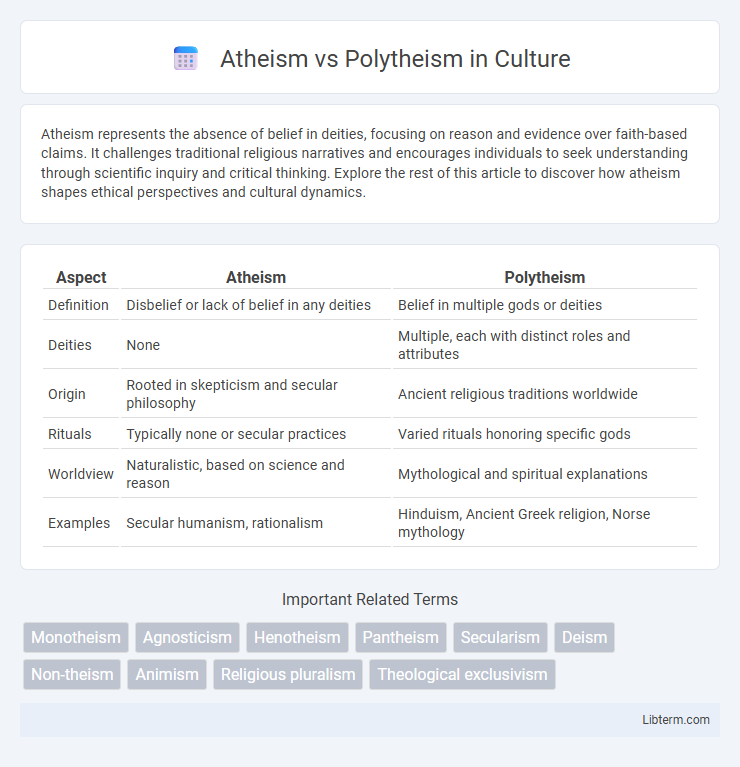Atheism represents the absence of belief in deities, focusing on reason and evidence over faith-based claims. It challenges traditional religious narratives and encourages individuals to seek understanding through scientific inquiry and critical thinking. Explore the rest of this article to discover how atheism shapes ethical perspectives and cultural dynamics.
Table of Comparison
| Aspect | Atheism | Polytheism |
|---|---|---|
| Definition | Disbelief or lack of belief in any deities | Belief in multiple gods or deities |
| Deities | None | Multiple, each with distinct roles and attributes |
| Origin | Rooted in skepticism and secular philosophy | Ancient religious traditions worldwide |
| Rituals | Typically none or secular practices | Varied rituals honoring specific gods |
| Worldview | Naturalistic, based on science and reason | Mythological and spiritual explanations |
| Examples | Secular humanism, rationalism | Hinduism, Ancient Greek religion, Norse mythology |
Introduction to Atheism and Polytheism
Atheism is the absence of belief in any deities, often grounded in skepticism and reliance on empirical evidence, shaping secular worldviews. Polytheism, characterized by the belief in multiple gods or divine beings, is foundational to many ancient and contemporary religions such as Hinduism and Ancient Greek religion. Understanding both concepts highlights contrasting approaches to spirituality and the nature of divinity within human cultures.
Historical Origins of Atheism and Polytheism
Polytheism, traced back to prehistoric societies, manifests in ancient civilizations such as Mesopotamia, Egypt, and Greece, where multiple deities governed natural and social orders. Atheism's historical origins emerge prominently in classical antiquity, notably within Greek philosophy, where thinkers like Democritus and Epicurus challenged traditional gods' existence through rational inquiry. The development of atheism intertwines with the rise of scientific reasoning and skepticism during the Enlightenment, contrasting with polytheism's enduring ritualistic and mythological frameworks.
Core Beliefs and Philosophical Foundations
Atheism rejects belief in any deities, emphasizing empirical evidence and often adhering to secular humanism or naturalism as its philosophical foundation. Polytheism embraces multiple gods, each representing different aspects of life or nature, grounded in mythological traditions and spiritual pluralism. While atheism questions divine existence and promotes skepticism, polytheism fosters ritualistic practices and interconnected cosmologies reflecting diverse cultural values.
Prominent Cultures and Societies Embracing Each View
Ancient Greece and India prominently embraced polytheism, with societies venerating numerous deities like Zeus and Vishnu, shaping their cultural and religious practices. In contrast, modern Western and East Asian societies often reflect atheistic perspectives, emphasizing secularism and scientific rationalism in governance and education. These differing worldviews influence social norms, philosophical discourse, and cultural identities within each region.
Arguments Supporting Atheism
Arguments supporting atheism emphasize the lack of empirical evidence for the existence of deities, highlighting the reliance on scientific inquiry and rational skepticism. Atheists argue that polytheistic beliefs, involving multiple gods with varied and often contradictory attributes, lack coherence and are rooted in cultural mythology rather than objective reality. The cognitive burden of disproving numerous gods makes atheism a simpler, more parsimonious worldview aligned with Occam's razor and the principles of critical thinking.
Arguments Supporting Polytheism
Polytheism offers a diverse framework for understanding the divine by acknowledging multiple gods, each embodying different aspects of life and nature, which resonates with cultural and individual experiences. It provides a rich tapestry of myths and rituals that foster community identity and moral guidance through relatable deities. This multiplicity also allows for adaptability and inclusivity, accommodating various beliefs and practices within a single religious system.
Influence on Ethics and Morality
Atheism often grounds ethics and morality in secular humanism, emphasizing reason, empathy, and social contracts without reliance on divine authority, promoting adaptable moral frameworks based on human well-being. Polytheism typically integrates a diverse pantheon of gods whose narratives and commandments shape cultural norms and moral codes, reinforcing ethical behavior through mythological examples and ritual obligations. The influence on ethics varies: atheism tends to prioritize universal, rational principles, while polytheism links morality closely with religious tradition and divine mandate.
Impact on Art, Literature, and Culture
Atheism often inspires art and literature that explores themes of existentialism, humanism, and secular morality, fostering cultural expressions rooted in skepticism and scientific inquiry. Polytheism influences art through vibrant depictions of diverse gods and mythologies, enriching literature with allegorical stories and rituals that reflect cultural identities and spiritual traditions. Both belief systems shape cultural norms and creative outputs, reflecting their underlying worldviews and values in various artistic and literary forms.
Contemporary Relevance and Trends
Atheism is gaining traction globally, especially among younger generations and in secular urban centers, driven by scientific advancements and increasing skepticism toward traditional religious authority. Polytheism maintains cultural and spiritual significance in regions such as South Asia, where it integrates with modern practices and festivals, reflecting a resilient pluralistic religious identity. The rise of digital communities has facilitated the exchange of atheistic and polytheistic ideas, promoting dialogue and influencing contemporary debates on spirituality and belief systems.
Conclusion: Contrasts and Intersections
Atheism denies the existence of deities, focusing on empirical evidence and skepticism, while polytheism embraces multiple gods with diverse attributes and mythologies. Both perspectives shape cultural worldviews and influence ethical systems, often addressing the human quest for meaning and understanding of the universe. Despite fundamental differences, atheism and polytheism intersect in their responses to existential questions and the search for identity beyond empirical reality.
Atheism Infographic

 libterm.com
libterm.com